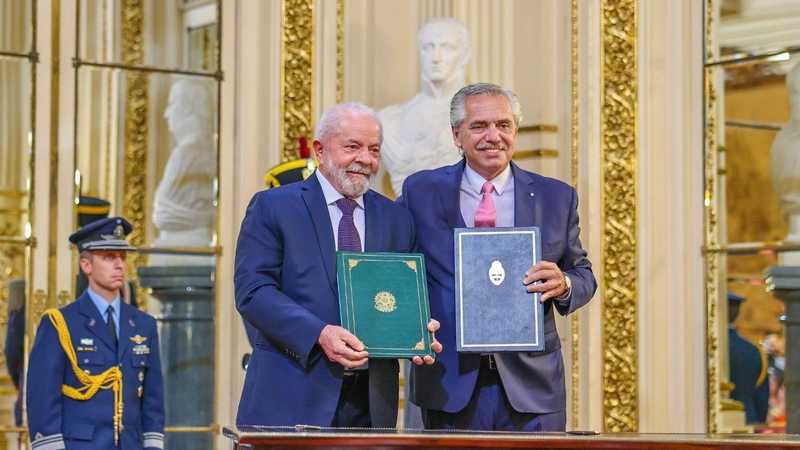
Trade volume between Brazil and Mercosur.
Outdated international financial architecture forces Latin American countries to resort to the dollar for their economic relations with each other. Every currency exchange operation incurs a commission paid to a financial intermediary, but that is the least of the problem. When dollars become scarce in one of the countries (the case of Argentina today as it is forced to pay a criminal debt to the IMF), the regional trade which could provide some respite, ebbs away. And those who depend on dollars are subject to sanctions, blockades and US seizures. These currently affect Cuba and Venezuela, from which $20 billion dollars have been frozen.
The alternative, outlined by Lula and Alberto Fernández, is Sur, a common exchange currency unit. The studies required to create it will soon commence. Projections are that, when it comes into being, it will function as a reference for international economic transactions. An Argentine company interested in buying machinery in Brazil will no longer need to chase dollars. Using the Sur and national currency exchange rates as a base, it will deposit the corresponding amount in pesos and the Brazilian seller will receive the amount in reais. And as simply as that, imperial meddling by the US currency will have been bypassed.
Under the current conditions nobody can escape the dollar hegemony, which still reflects the international order that emerged after World War II. Given that Washington issues money according to its own interests, it enjoys incomparable advantages, essential to financing its immense military budget for example. In recent years, the search for an alternative multilateral monetary system has accelerated, but it is a very lengthy process as it depends on economic agents trusting a new currency, including as an expression of their own wealth. China, which has the power to begin its construction, is committed, and the emergence of de-dolarised regional blocs (like the one that may emerge around Sur) could be part of the structure, as shown in this essay. The emergence of central bank-issued digital currencies, a more recent development, is also likely to be a strong accelerator.
There is however a major pitfall to avoid in the temptation of a new euro, which the Argentinean Minister of Economy Sergio Massa has flirted with. Under current conditions, such a currency could only be managed by a technocratic entity with no ties to the member states' democratic institutions, which would consequently leave it at the mercy of the financial aristocracy. Who would decide the conditions under which it would be issued? Nation states would lose their ability to use money as a policy instrument - issuing it to finance excellent public services or the energy transition, for example. This is already happening in Europe, where the end of national currencies is one of the major causes of the decline of the welfare state.
Although overshadowed by the debate on the single currency, Lula's agenda in Buenos Aires is broad. More straightforward integration measures, neglected for more than ten years, are being resumed. If they prosper, Argentina could for example sell the natural gas it extracts from the Vaca Muerta field in northern Patagonia to Brazil, and receive Brazilian electricity in return. Brasilia, which currently has a positive trade balance and abundant foreign currency reserves, is well positioned to help Buenos Aires get rid of its dollar shortage. In exchange, instead of buying industrial inputs from the US or China, Argentines would be able to do so from Brazil.
Even more important are the prospects for rebuilding Latin American integration. In addition to Alberto Fernández and Lula, Gustavo Petro (Colombia), Gabriel Boric (Chile), Miguel Diaz-Camel (Cuba) and Luis Alberto Lacalle (Uruguay) are attending the CELAC summit in Buenos Aires. Former Foreign Minister Celso Amorim has long said that overcoming fascism and reconstituting a democratic government in Brazil could produce a resurgence of integration. This is what is expected and will be worth following closely from now on.
Antonio Martins is editor at Outras Palavras.
Photo: Lula da Silva / Twitter






